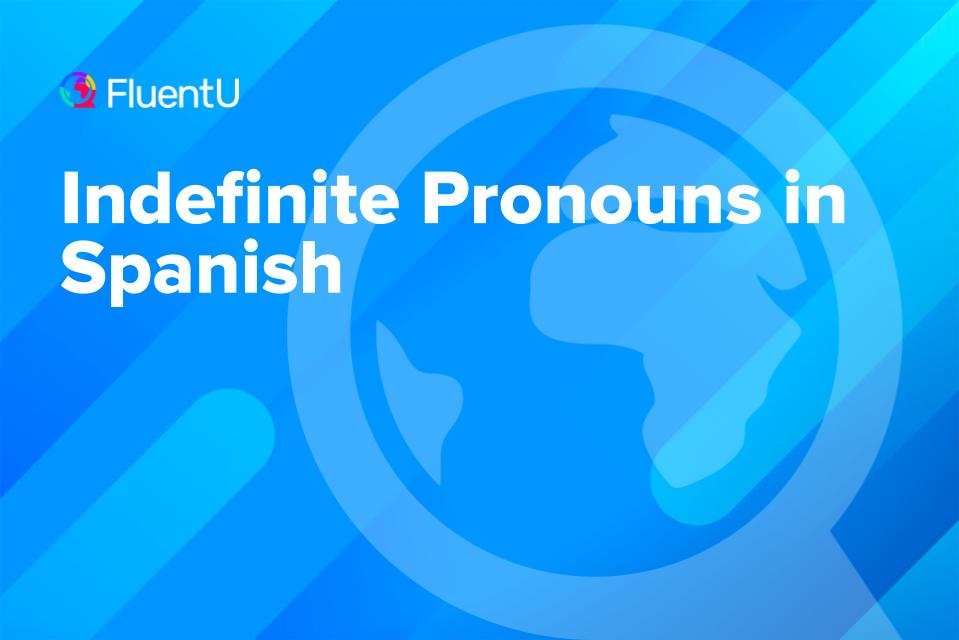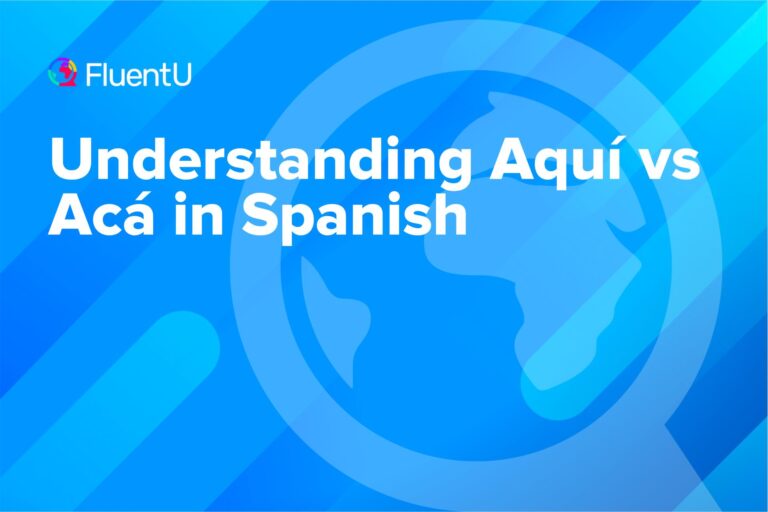Contents
- What Are Spanish Indefinite Pronouns
- Indefinite Pronouns in Spanish
- 1. Algo (Something)
- 2. Alguien (Somebody, Someone)
- 3. Alguno (One, Some, Any)
- 4. Bastante (Enough)
- 5. Cualquiera (Any, Any One, Anyone)
- 6. Demasiado (Too Much, Too Many)
- 7. Mucho (Much, Many, A Lot)
- 8. Nada (Nothing, Not Anything)
- 9. Nadie (No One, Not Anyone)
- 10. Ninguno (None, Not Any, No One, Nobody)
- 11. Otro (Other One, Another One, Some Other)
- 12. Poco (Little, A Little, Few, A Few)
- 13. Varios (A Few, Some, Several)
- Spanish Indefinite Adjectives
- And One More Thing…
Indefinite Pronouns in Spanish

Indefinite pronouns are a type of pronoun that doesn’t refer to any particular person or thing. In English, they’re words like “something,” “someone” and “nothing.” In Spanish, common indefinite pronouns are words like algo (something), alguien (someone) and nada (nothing).
They’re incredibly useful words, as we’re about to see, but it’s important to learn which ones to use in which situations. Are you ready?
Download: This blog post is available as a convenient and portable PDF that you can take anywhere. Click here to get a copy. (Download)
What Are Spanish Indefinite Pronouns
As we know, pronouns can substitute any noun. You might know the noun that they are referring to, or you might not.
The sorts of pronouns that refer to vague or unknown people, objects, animals and thoughts are called indefinite pronouns. The nouns they substitute will not always be defined or specific, so the name kind of makes sense.
Indefinite Pronouns in Spanish
1. Algo (Something)
Algo is one of those pronouns that is not gender- or number-specific. Since algo refers to something unknown or unspecified, we cannot ascribe any gender or number to it.
Remember that we can also use algo when we do not want to give away information.
He oído algo raro. (I have heard something strange.)
¿Has comprado algo? (Have you bought something?)
Algo no va bien. (Something is not right.)
2. Alguien (Somebody, Someone)
Similar to algo, alguien also substitutes an unknown or unspecified noun. The difference, however, is that we are talking about people, not objects, this time. The all-singular rule also applies, whether we know the number of people referred to or not.
¿Hay alguien ahí? (Is anyone there?)
Alguien está llamando a la puerta. (There is someone knocking on the door.)
Ya tengo a alguien en mi vida. (I already have somebody in my life.)
3. Alguno (One, Some, Any)
Variations: Alguna , algunos , algunas
Just as its adjectival counterpart, alguno and its forms can be used to refer to people, things, animals and thoughts/ideas.
The singular forms alguno and alguna are the two mainly used. Many speakers, even when referring to a plural noun, prefer to use the singular form to make things easier. You can use the one you prefer, but for the sake of clarity I will be using the forms our grammar prescribes.
One last thing before giving you some examples: Remember to choose the appropriate form depending on the gender and number of the noun!
“¿Tienes un lápiz?” “Debo tener alguno por aquí.” (“Do you have a pencil?” “I must have one around here.”)
¿Te queda alguna? (Do you have any left?)
Algunos son muy caros. (Some of them are very expensive.)
4. Bastante (Enough)
Variation: Bastantes
I know this one may be weird for some of you. Enough is enough! Well… not in Spanish!
Bastante is not gender specific, but it certainly is number specific. It normally goes like this: use bastante with singular and uncountable nouns, and use bastantes with plurals. Easy!
¿Tienes bastante dinero? (Do you have enough money?)
No queda bastante. (There is not enough left.)
“¿Tienes amigos?” “Tengo bastantes.” (“Do you have any friends?” “I have enough of them.”)
5. Cualquiera (Any, Any One, Anyone)
Variation: Cualesquiera
We use cualquiera and cualesquiera when we are referring to people or objects and we do not care which one or ones will be the “chosen ones.” Some people may call this being lazy or not wanting to make a decision. We Spaniards call it giving others the chance to choose for us.
Imagine you want to buy a book. Any book. You go to a bookstore and ask for a book, and the seller will probably ask:
¿Qué clase de libro? (What kind of book?)
If you do not mind which one you will be getting, you can just say:
Cualquiera me vale. (Any one will do.)
Strange, but not impossible. So remember: if you do not mind which person or object will be chosen, go for cualquiera:
¿Puede cualquiera ser un buen traductor? (Can anyone be a good translator?)
“¿Qué colores quieres?” “Cualesquiera.” (“Which colors do you want?” “I do not mind/Any will do.”)
6. Demasiado (Too Much, Too Many)
Variations: Demasiada
, demasiados
, demasiadas
Demasiado is specific to gender and number so bear that in mind when using it in a sentence.
Use the singular forms when you are referring to uncountable nouns, and the plural ones when you are referring to countable ones:
Ya tengo demasiado. (I have too much already.)
¿Piensas que he añadido demasiada? (Do you think I have added too much?)
Para ti nunca hay demasiadas. (There are never too many for you.)
7. Mucho (Much, Many, A Lot)
Variations: Mucha , muchos , muchas
Mucho is very similar to demasiado in that you will use the singular forms with uncountable nouns and the plural ones with countable nouns. This is one of the most often-used Spanish indefinite pronouns, and a perfect example of what “undetermined quantity” means:
Nos ha sobrado mucho. (We have a lot left.)
Hay muchos más de lo que pensaba. (There are a lot more than I thought.)
“¿Cuántas amigas tienes?” “Muchas.” (“How many girl friends do you have?” “A lot.”)
8. Nada (Nothing, Not Anything)
Nada is algo’s pessimistic sister. It is very easy to use, but it works differently depending on its place in the sentence.
If you negate a verb with no, you can later on use nada and create a double negative:
No me gusta nada. (I do not like anything.)
No ha traído nada. (He has not brought anything.)
If you negate the verb with nada, then you are not allowed to use no in the sentence:
Nada me gusta. (I like nothing.)
Nada ha traído. (He has brought nothing.)
9. Nadie (No One, Not Anyone)
Similarly to what we had with algo and nada, nadie is alguien’s sister. Additionally, the two rules regarding negation also apply here. Have a look:
No me gusta nadie. (I do not like anyone.)
Nadie me gusta. (I like no one.)
No ha venido nadie. (No one has come.)
10. Ninguno (None, Not Any, No One, Nobody)
Variations: Ninguna , ningunos , ningunas
Once again we have an example of a negative counterpart to a positive pronoun. In this case, ninguno is alguno’s negation.
As was the case with alguno, Spanish native speakers tend to avoid using the plural forms for the sake of simplification. After all, if we have zero nouns, it does not make sense to use the plural. However, I will use the “more grammatical way” and keep the gender and number agreements.
Negation rules apply here once again:
No queda ninguno. (There is none left.)
No queremos ningunos. (We do not want any.)
“¿Tienes ganas de cantar?” “Ningunas.” (“Do you feel like singing?” “Not at all.”)
11. Otro (Other One, Another One, Some Other)
Variations: Otra , otros , otras
This one is very easy. Use otro when you want a different instance of the noun referred to. Remember to keep the gender and number agreements:
Dame otro. (Give me another one.)
Pareces otra. (You look like another person/a different person.)
As with its adjectival counterpart, you can add más to otro/a to change the meaning to “one more”:
Dame otro más. (Give me one more.)
Quiero otra más. (I want one more.)
12. Poco (Little, A Little, Few, A Few)
Variations: Poca , pocos , pocas
Poco should not be difficult to remember if you follow a couple of simple rules. Use it by itself when you mean “little” (poco/a) and “few” (pocos/as):
Tengo poco. (I have little.)
Es muy poca. (That is very little.)
Me quedan pocos. (I have few left.)
Also, add un/a/os/as accordingly when you mean “a little” (un poco, una poca) and “a few” (unos pocos, unas pocas):
Necesito un poco. (I need a little.)
Dame una poca. (Give me a little.)
Me quedan unos pocos. (I have a few left.)
He comprado unas pocas. (I have bought a few.)
13. Varios (A Few, Some, Several)
Variation: Varias
Finally, we have an example of a Spanish indefinite pronoun that does not exist in the singular form. By nature, varios will always be plural.
There is no specific quantity that varios refers to. This is not surprising due to the fact that it is an indefinite pronoun. However, you will normally know approximately if we are talking about a few or several depending on the context.
Have a look at these examples:
Me quedan varios. (I have a few/some left.)
Tengo varias en la nevera. (I have some in the fridge.)
Hay varias en el universo. (There are several in the universe.)
To understand the different contexts you should use varios (and the other indefinite pronouns) in, I’d recommend consuming some authentic content—this way you can see how they’re used by native speakers. FluentU can be a good option for this.
FluentU takes authentic videos—like music videos, movie trailers, news and inspiring talks—and turns them into personalized language learning lessons.
You can try FluentU for free for 2 weeks. Check out the website or download the iOS app or Android app.
P.S. Click here to take advantage of our current sale! (Expires at the end of this month)

FluentU also has a Spanish YouTube channel, where you can find videos like this one that use popular TV shows and movies to teach meaningful vocabulary, grammar and cultural context:
Spanish Indefinite Adjectives
Indefinite adjectives are Spanish adjectives that refer to non-specific nouns. When I say non-specific nouns, what I mean is that the people, things or animals they are referring to are not specific or not clearly known.
Instead of replacing the noun, as a pronoun does, they modify the nouns they are speaking about and will always precede the noun they are referring to. Additionally, both the indefinite adjective and their noun need to agree in gender and number.
Indefinite adjectives are very similar to indefinite pronouns and, most of the time, they look exactly the same. However, remember their big difference: While an indefinite adjective will accompany and modify a noun, indefinite pronouns substitute nouns. This means they will not be modifying any noun nor will they be accompanying it. They function by themselves.
Let’s have a look at the Spanish indefinite adjective algún (some, any, one). As in English, the Spanish algún is used to talk about a person or thing that is not specific. Maybe it is not specific because we do not have the necessary information or maybe because it does not matter, but the fact remains we are not referring to anyone or anything specific.
Have a look at some examples:
¿Algún voluntario? (Any volunteer?)
Necesito comprar algún libro. (I need to buy some book.)
Algún día lo sabrás. (One day you will know.)
As you can see, even though we have a noun, the indefinite adjective tells us that we are talking about any instance of that noun. The noun is yet to be defined. That is why it is called indefinite.
Apart from algún, alguna, algunos, algunas, there are many other indefinite adjectives. Here are four of the most important ones and some sample sentences for each:
- Cada (each, every). Cada is a very special indefinite adjective because it is invariable: It has no feminine and no plural form.
Cada estudiante tiene un libro. (Each student has one book.)
Voy a correr cada mañana. (I go running every morning.)
- Cierto/a/os/as (certain, specific). With cierto, the speaker almost certainly knows what is being referred to (although there are exceptions) but they want to keep it a mystery or, simply put, do not want people to know what they are talking about.
Ayer vi a cierta chica… (I saw a certain girl yesterday…)
Te he comprado cierto libro. (I have bought you a certain book.)
Va a traer ciertas flores. (She is bringing certain flowers.)
Be careful with this adjective, though. If you use it after the noun, the meaning is different and it is no longer an indefinite adjective. In this case, it will be translated as “sure, accurate, true.” Have a look:
Es una leyenda cierta. (It is a true legend.)
Luchar significaba una muerte cierta. (Fighting meant a sure death.)
- Ningún/a/os/as (no, not any). Treat these four adjectives as the negative siblings of algún/a/os/as. While the latter meant “some,” ningún and its family are used to refer to the lack of a certain noun.
Spanish native speakers hardly ever use the plural forms ningunos and ningunas. The simplest explanation here is that if there are no people or objects, using a plural makes no sense.
No tengo ningún hermano. (I do not have any brothers.)
No me hace ninguna gracia. (It is absolutely not funny for me. Lit.: “It does not make me any joke.” )
No queda ningún asiento libre. (There is no free seat left.)
- Otro/a/os/as (other, another). You may be tempted to add un or una in front of this adjective in order to make it more similar to English. This is incorrect 100% of the time, so remember to use it by itself.
Quiero otro libro. (I want another book.)
Necesitamos otra manguera. (We need another hose.)
Ha traído los otros cojines. (She has brought the other cushions.)
If you add más after a noun modified by otro/a, then the meaning changes and you will have to translate it as “one more (noun).”
Dame otro libro más. (Give me one more book.)
Necesito otra cuchara más. (I need one more spoon.)
And that is all from me!
I hope you now feel more confident when having to use an indefinite pronoun or adjective in your Spanish conversations.
Bear in mind the key to success is practicing a lot, so take a pen and a piece of paper and start writing some sentences down.
And as always, happy learning!
Download: This blog post is available as a convenient and portable PDF that you can take anywhere. Click here to get a copy. (Download)
And One More Thing…
If you've made it this far that means you probably enjoy learning Spanish with engaging material and will then love FluentU.
Other sites use scripted content. FluentU uses a natural approach that helps you ease into the Spanish language and culture over time. You’ll learn Spanish as it’s actually spoken by real people.
FluentU has a wide variety of videos, as you can see here:

FluentU brings native videos within reach with interactive transcripts. You can tap on any word to look it up instantly. Every definition has examples that have been written to help you understand how the word is used. If you see an interesting word you don’t know, you can add it to a vocab list.

Review a complete interactive transcript under the Dialogue tab, and find words and phrases listed under Vocab.

Learn all the vocabulary in any video with FluentU’s robust learning engine. Swipe left or right to see more examples of the word you’re on.

The best part is that FluentU keeps track of the vocabulary that you’re learning, and gives you extra practice with difficult words. It'll even remind you when it’s time to review what you’ve learned. Every learner has a truly personalized experience, even if they’re learning with the same video.
Start using the FluentU website on your computer or tablet or, better yet, download the FluentU app from the iTunes or Google Play store. Click here to take advantage of our current sale! (Expires at the end of this month.)







